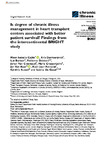Mostrar o rexistro simple do ítem
Is degree of chronic illness management in heart transplant centers associated with better patient survival?: findings from the intercontinental BRIGHT study
| dc.contributor.author | Cajita, Maan Isabella | |
| dc.contributor.author | Denhaerynck, Kris | |
| dc.contributor.author | Berben, Lut | |
| dc.contributor.author | Dobbels, Fabienne | |
| dc.contributor.author | Van Cleemput, Johan | |
| dc.contributor.author | Crespo-Leiro, María Generosa | |
| dc.contributor.author | Van Keer, Jan | |
| dc.contributor.author | Poncelet, Alain Jean | |
| dc.contributor.author | Russell, Cynthia | |
| dc.contributor.author | De Geest, Sabina | |
| dc.date.accessioned | 2021-10-05T10:47:12Z | |
| dc.date.available | 2021-10-05T10:47:12Z | |
| dc.date.issued | 2021-09-22 | |
| dc.identifier.citation | Cajita MI, Denhaerynck K, Berben L, Dobbels F, Van Cleemput J, Crespo-Leiro M, et al. Is degree of chronic illness management in heart transplant centers associated with better patient survival?: findings from the intercontinental BRIGHT study. Chronic Ill. 2021 Sep 22. Epub | es_ES |
| dc.identifier.issn | 1742-3953 | |
| dc.identifier.uri | http://hdl.handle.net/2183/28571 | |
| dc.description.abstract | [Abstract] Purpose: To explore the association between the degree of Chronic illness management and survival rates at 1-, 3-, 5-years post heart transplantation. Methods: Exploratory secondary analysis of a cross-sectional, international study (Building Research Initiative Group study). Latent profile analysis was performed to classify 36 heart transplant centers according to the degree of chronic illness management. Results: The analysis resulted in 2 classes with 29 centers classified as "low-degree chronic illness management" and 7 centers as "high-degree chronic illness management". After 1-year posttransplantation, the high-degree chronic illness management class had a significantly greater mean survival rate compared to the low-degree chronic illness management class (88.4% vs 84.2%, p = 0.045) and the difference had a medium effect size (η2 = .06). No difference in survival for the other time points was observed. Patients in high-degree chronic illness management centers had 52% lower odds of moderate to severe drinking (95% confidence interval .30-.78, p = 0.003). No significant associations between degree of chronic illness management and the other recommended health behaviors were observed. Conclusions: The findings from this exploratory study offer preliminary insight into a system-level pathway (chronic illness management) for improving outcomes for heart transplant recipients. The signals observed in our data support further investigation into the effectiveness of chronic illness management-based interventions in heart transplant follow-up care. | es_ES |
| dc.language.iso | eng | es_ES |
| dc.publisher | SAGE | es_ES |
| dc.relation.uri | https://doi.org/10.1177/17423953211039773 | es_ES |
| dc.rights | Atribución-NoComercial 3.0 España | es_ES |
| dc.rights.uri | http://creativecommons.org/licenses/by-nc/3.0/es/ | * |
| dc.subject | Chronic illness management | es_ES |
| dc.subject | Heart transplant | es_ES |
| dc.subject | Latent profile analysis | es_ES |
| dc.subject | Patient outcomes | es_ES |
| dc.subject | Survival | es_ES |
| dc.title | Is degree of chronic illness management in heart transplant centers associated with better patient survival?: findings from the intercontinental BRIGHT study | es_ES |
| dc.type | info:eu-repo/semantics/article | es_ES |
| dc.rights.access | info:eu-repo/semantics/openAccess | es_ES |
| UDC.journalTitle | Chronic Illness | es_ES |
Ficheiros no ítem
Este ítem aparece na(s) seguinte(s) colección(s)
-
INIBIC-ICATC - Artigos [174]






